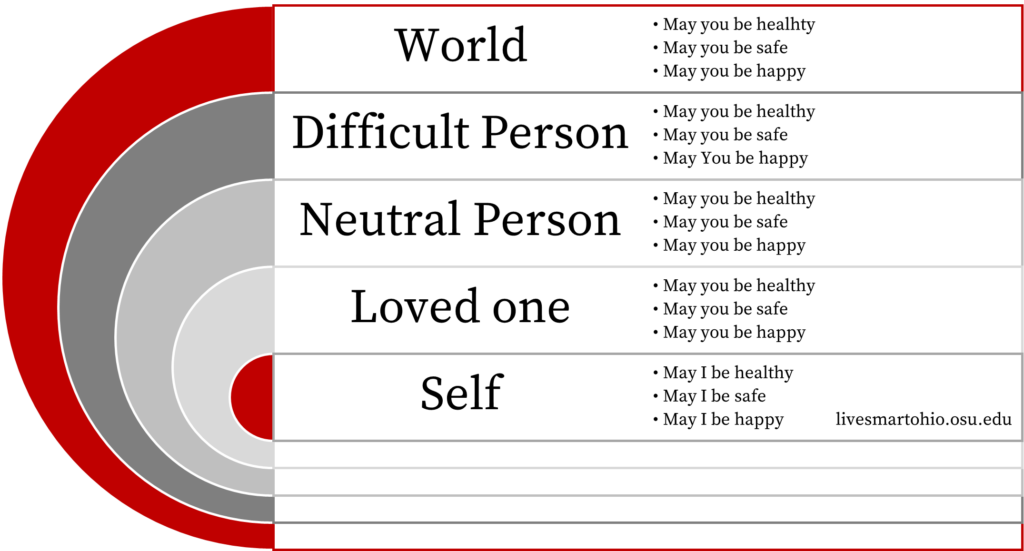Loving-kindness practice, also known as Metta meditation, can increase benevolence in our lives. Metta has also been translated as universal goodwill or loving-friendliness or unconditional positive regard and has been used for thousands of years. Research on this type of mindfulness practice has shown increased happiness, feeling more connected to others, and some have found lower symptoms of anxiety and depression.
Breathing is used as an anchor for many different types of mindfulness practices. When your mind wanders (as it will), bring your attention back to your anchor. While this practice might start with some deep breaths, the anchor is the key phrases that are used over and over. The most common phrases are simple and concise, but powerful. You will fill in the blank with “I” for yourself, or someone’s name, or “you” or “they” when you use the phrases. For example,
- May ___ be happy
- May ___ be peaceful
- May ___ be free from suffering
You can choose any words and phrases that you’d like. Another example is shared with instructions for mindful parents or caregivers, called Kindness to Myself and to My Child. It uses these phrases:
- May ___be well
- May ___ be peaceful and at ease
- May __ live with ease of heart
- May ___ be happy and free
In the basic practice, these chosen messages will be directed, “towards oneself, toward specific others or in all directions to all beings” (Hoffman, 2011). Kristin Neff has researched self-compassion and notes that sometimes, “it can be difficult to feel loving towards ourselves, and we’re more likely to judge and criticize ourselves instead.” If that is the case, she suggests starting with a loved one or start with ourselves and picture a loved on speaking kindly to us. You can do this practice alone, or as in the example for parents with a child or loved one, or it could be practiced as a family or other group. You might repeat the phrases silently in your mind or you might choose to listen to a guided practice. Here is a loving-kindness example.
- As with any mindfulness practice, find a comfortable position. Become aware of your breathing. Bring into your awareness, attention, or an image of yourself. Silently or aloud state the loving-kindness phrases to yourself.
- Next, bring to mind someone you love and care about. It might be a family member, a friend, a pet, a beloved colleague, or someone helpful in your life. Notice how you feel as you bring this person to mind. Repeat and extend the phrases to them.
- Next, think of a neutral person. This is a person in your life that you might not know very well like a parent you pass in the pick-up line, a person who delivers your mail, or someone who makes your coffee in the morning. Bring this person to mind and send them these statements.
- Next, bring to mind someone who has frustrated you lately, someone who is a little difficult. Send this individual a kind wish by repeating the phrases for them.
- If you’d like to choose a much larger group, community, people across the world, or our planet earth, repeat and send the statements to this larger audience. Check in with your mind and body as you conclude this practice.

In conclusion, “the point of it is: We don’t have to be perfectly loving beings at all times… Instead, we strive to do our best and aim for that middle path: loving, caring, and acts of kindness” (Williard, 2019). As a reminder, the benefits of mindfulness practices are best experienced when repeated on a regular basis. Loving-kindness meditations can be used at any time, but I recommend starting or ending your day with this type of mindfulness practice.

